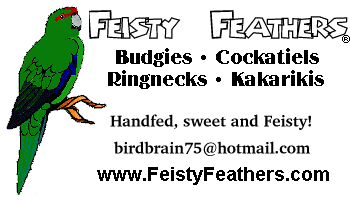

The first thing you need to do is decide on the right species. This requires a bit of research
and involves you knowing exactly what you want.
Size
Lifespan
Price
Noise
Character
Availability
Speech
Now come the things you need to look for while you're actually out shopping for your species.
Appearance
Other Birds in the Cage
Age
Price
The Seller
How big do you want your bird? Size plays a large role in other bird characteristics. It can
affect noise, the amount you'll have to spend on a cage and toys, the lifespan and the price.
Larger birds generally live longer. Budgies can live up to 15 but often die much earlier due to
malnutrition or tumors. Cockatiels and other big smaller birds like conures and senegals can live
from 20-30. Most of the parrots like amazons and African greys can live 50-80. Macaws have been
known to make it to 100. So larger birds mean a much longer commitment.
The bigger the bird the larger the price tag. Some rare birds and newly developed colors can also
cost quite a bit.
Parrots tend to scream and so do many conures. Aussie keets usually have nice softer sounds and
Africans are known for being rather quiet.
Each species varies in character and it's very important to pick one that you can get along with.
Some people like cuddlers while others prefer boisterous birds.
It's no use picking a species that is very rare and belongs in a breeding program (unless that's
why you're searching for it). Hyacinth macaws, vasa parrots, hawkheads and Brotogeris are
best left to those who are seeking to boost the captive population.
This is the last quality in the world to be looking for in a bird. Anyone who picks a species
soley on it's ability to talk is making a grave mistake. Don't get me wrong, it's a nice thing
to have, but it's only the icing on the cake.
Birds that are moving around in the cage and making lots of noise are often healthy, happy birds.
The bird should look healthy. Colors should be bright. Feathers, eyes, vent, nostrils and everything
else should be clean.
Check the other birds in the cage. Do they look bad? If so you'd best move along. Maybe they
are ill and the one bird you like just hasn't displayed any symptoms yet.
Always go for a younger bird, freshly weaned. This goes for both pet owners and breeders. Pet
owners will get a baby that will adjust easier and be easier to tame. Breeders will get a bird
that will adapt more willingly to a new setup, have more time to bond with a prospective mate, and
is guaranteed not be someone else's burnt out or bad breeder.
In general don't buy from pet stores. Their price will be double that of anything offered by a
private breeder. Shop around to get an idea of what the usual price is.
The seller can tell you a lot about the bird being offered. You want to buy from someone who is
knowledgable, helpful, knows the bird's history and is reputable. If the seller is junk most
likely the birds will be too.

All articles and images contained on this site are © 1998, 1999 by Feisty Feathers unless otherwise noted and may not be reprinted or used in any way without the author's permission.